Sustainable Business: Reflective Journal on People, Planet, Profit
VerifiedAdded on 2023/01/16
|5
|1401
|34
Journal and Reflective Writing
AI Summary
This reflective journal delves into the critical aspects of sustainable business practices, examining the interplay between people, the planet, and profit. The author explores key concepts such as the triple bottom line, the six forms of capital, and various approaches to sustainability in business. The journal reflects on the implications of these themes for the business sector, emphasizing the importance of incorporating social and environmental considerations alongside financial performance. It discusses the role of businesses in fostering societal development, addressing issues like unemployment, and promoting ethical conduct. The author also provides real-world examples, such as IKEA's recycling initiatives, to illustrate the practical application and benefits of sustainable business strategies. The journal emphasizes the need for businesses to adapt to changing times and consider the long-term impact of their actions on all stakeholders, advocating for a holistic approach to ensure the survival and prosperity of businesses in an interconnected global economy.
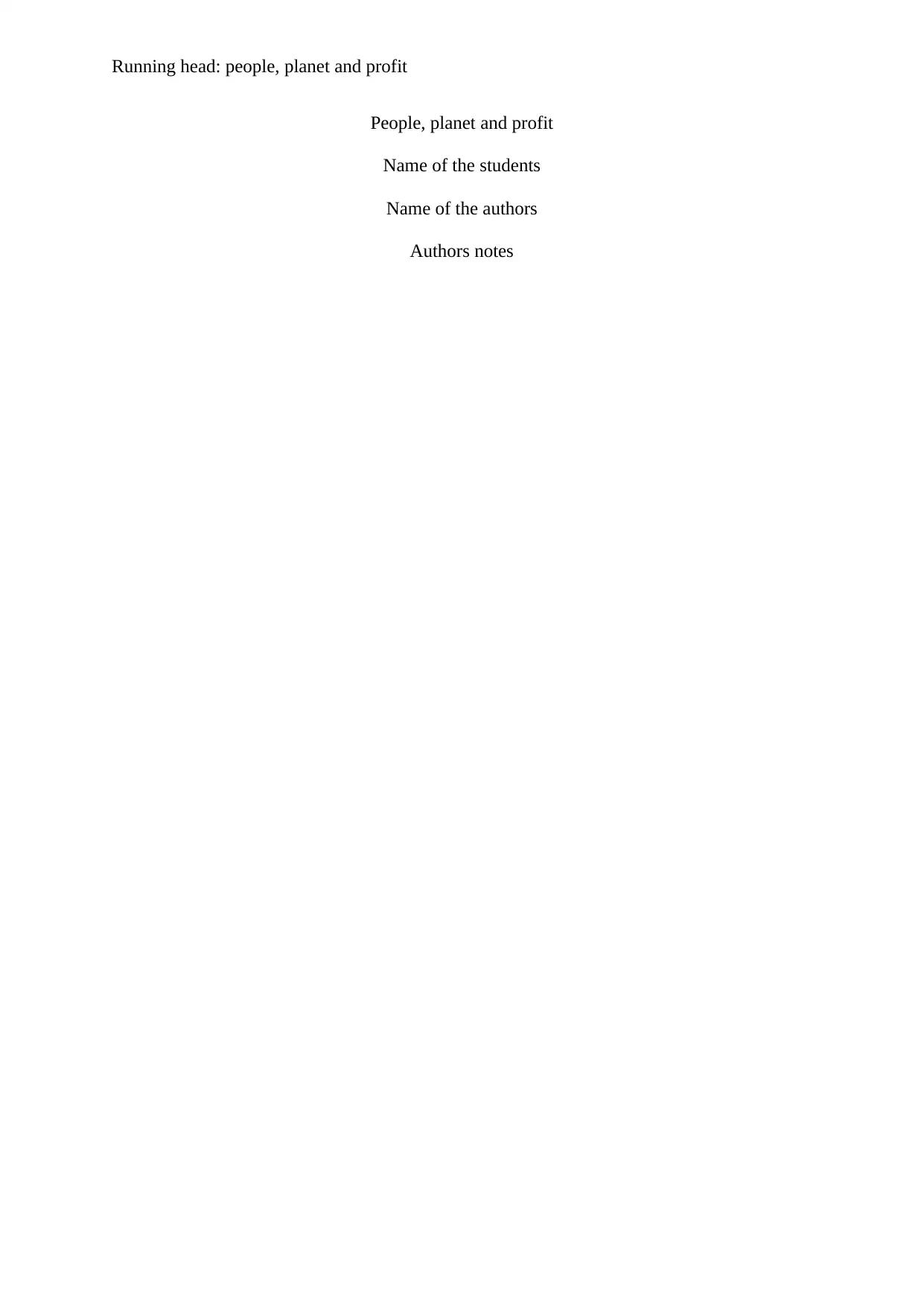
Running head: people, planet and profit
People, planet and profit
Name of the students
Name of the authors
Authors notes
People, planet and profit
Name of the students
Name of the authors
Authors notes
Paraphrase This Document
Need a fresh take? Get an instant paraphrase of this document with our AI Paraphraser
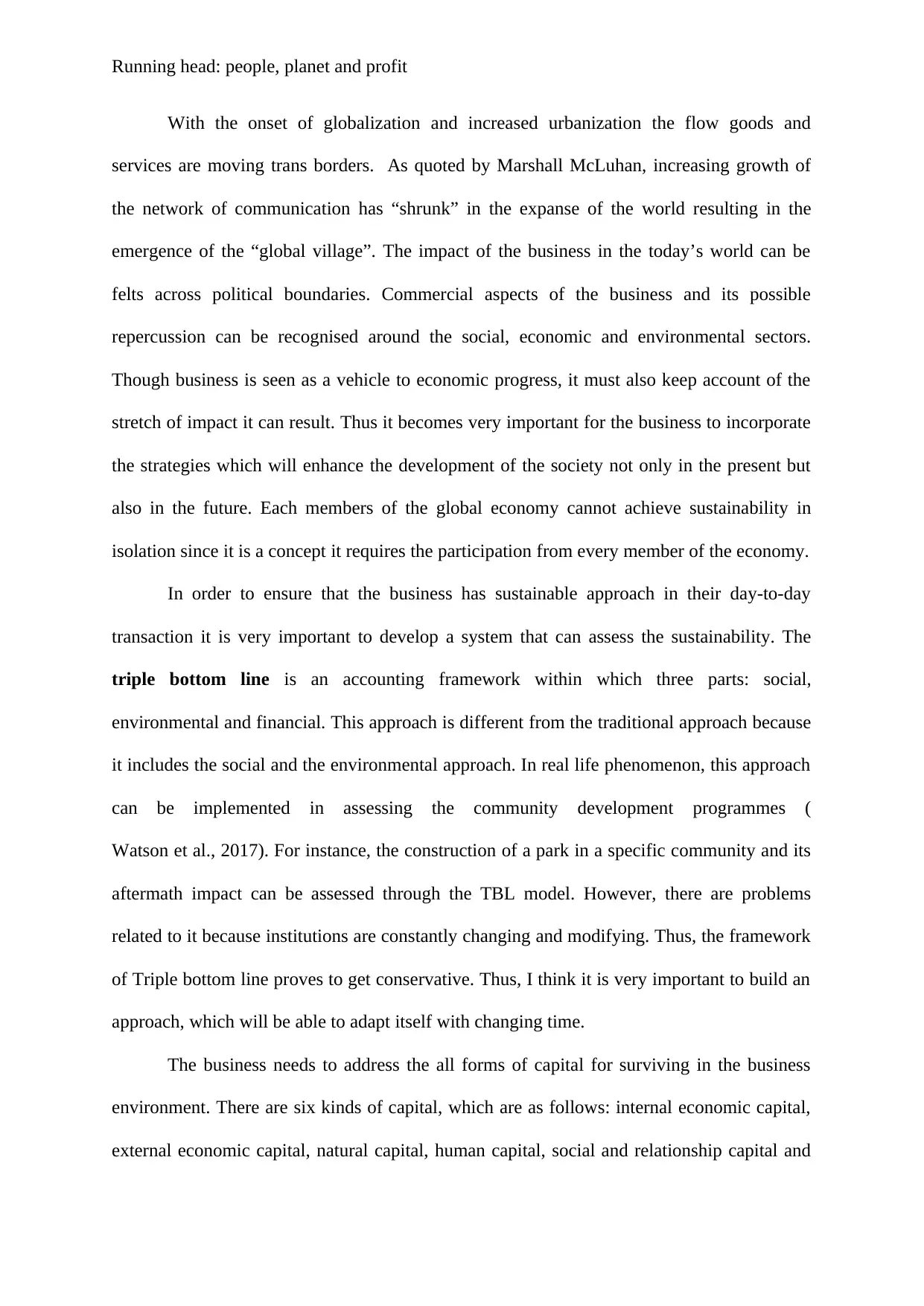
Running head: people, planet and profit
With the onset of globalization and increased urbanization the flow goods and
services are moving trans borders. As quoted by Marshall McLuhan, increasing growth of
the network of communication has “shrunk” in the expanse of the world resulting in the
emergence of the “global village”. The impact of the business in the today’s world can be
felts across political boundaries. Commercial aspects of the business and its possible
repercussion can be recognised around the social, economic and environmental sectors.
Though business is seen as a vehicle to economic progress, it must also keep account of the
stretch of impact it can result. Thus it becomes very important for the business to incorporate
the strategies which will enhance the development of the society not only in the present but
also in the future. Each members of the global economy cannot achieve sustainability in
isolation since it is a concept it requires the participation from every member of the economy.
In order to ensure that the business has sustainable approach in their day-to-day
transaction it is very important to develop a system that can assess the sustainability. The
triple bottom line is an accounting framework within which three parts: social,
environmental and financial. This approach is different from the traditional approach because
it includes the social and the environmental approach. In real life phenomenon, this approach
can be implemented in assessing the community development programmes (
Watson et al., 2017). For instance, the construction of a park in a specific community and its
aftermath impact can be assessed through the TBL model. However, there are problems
related to it because institutions are constantly changing and modifying. Thus, the framework
of Triple bottom line proves to get conservative. Thus, I think it is very important to build an
approach, which will be able to adapt itself with changing time.
The business needs to address the all forms of capital for surviving in the business
environment. There are six kinds of capital, which are as follows: internal economic capital,
external economic capital, natural capital, human capital, social and relationship capital and
With the onset of globalization and increased urbanization the flow goods and
services are moving trans borders. As quoted by Marshall McLuhan, increasing growth of
the network of communication has “shrunk” in the expanse of the world resulting in the
emergence of the “global village”. The impact of the business in the today’s world can be
felts across political boundaries. Commercial aspects of the business and its possible
repercussion can be recognised around the social, economic and environmental sectors.
Though business is seen as a vehicle to economic progress, it must also keep account of the
stretch of impact it can result. Thus it becomes very important for the business to incorporate
the strategies which will enhance the development of the society not only in the present but
also in the future. Each members of the global economy cannot achieve sustainability in
isolation since it is a concept it requires the participation from every member of the economy.
In order to ensure that the business has sustainable approach in their day-to-day
transaction it is very important to develop a system that can assess the sustainability. The
triple bottom line is an accounting framework within which three parts: social,
environmental and financial. This approach is different from the traditional approach because
it includes the social and the environmental approach. In real life phenomenon, this approach
can be implemented in assessing the community development programmes (
Watson et al., 2017). For instance, the construction of a park in a specific community and its
aftermath impact can be assessed through the TBL model. However, there are problems
related to it because institutions are constantly changing and modifying. Thus, the framework
of Triple bottom line proves to get conservative. Thus, I think it is very important to build an
approach, which will be able to adapt itself with changing time.
The business needs to address the all forms of capital for surviving in the business
environment. There are six kinds of capital, which are as follows: internal economic capital,
external economic capital, natural capital, human capital, social and relationship capital and
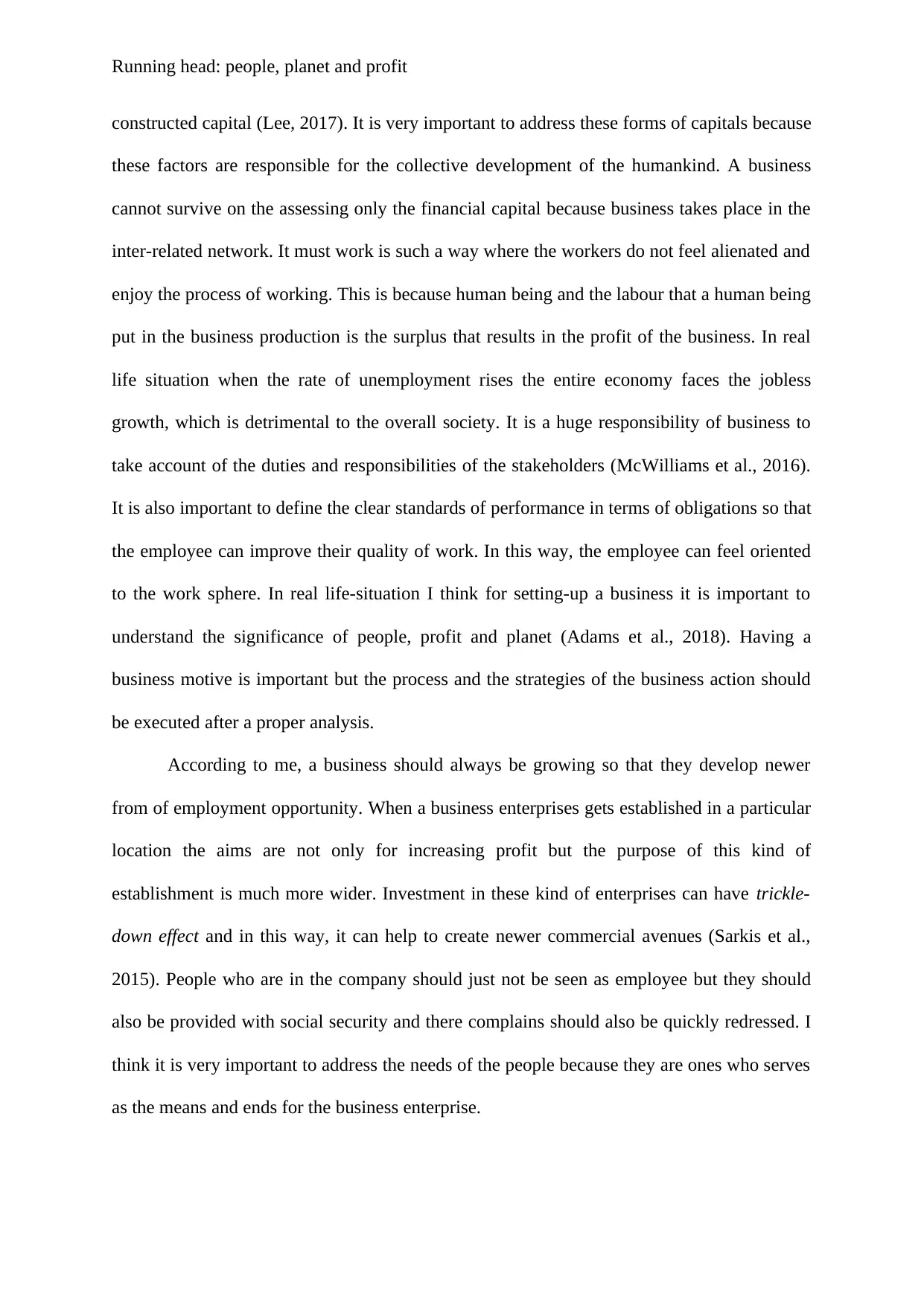
Running head: people, planet and profit
constructed capital (Lee, 2017). It is very important to address these forms of capitals because
these factors are responsible for the collective development of the humankind. A business
cannot survive on the assessing only the financial capital because business takes place in the
inter-related network. It must work is such a way where the workers do not feel alienated and
enjoy the process of working. This is because human being and the labour that a human being
put in the business production is the surplus that results in the profit of the business. In real
life situation when the rate of unemployment rises the entire economy faces the jobless
growth, which is detrimental to the overall society. It is a huge responsibility of business to
take account of the duties and responsibilities of the stakeholders (McWilliams et al., 2016).
It is also important to define the clear standards of performance in terms of obligations so that
the employee can improve their quality of work. In this way, the employee can feel oriented
to the work sphere. In real life-situation I think for setting-up a business it is important to
understand the significance of people, profit and planet (Adams et al., 2018). Having a
business motive is important but the process and the strategies of the business action should
be executed after a proper analysis.
According to me, a business should always be growing so that they develop newer
from of employment opportunity. When a business enterprises gets established in a particular
location the aims are not only for increasing profit but the purpose of this kind of
establishment is much more wider. Investment in these kind of enterprises can have trickle-
down effect and in this way, it can help to create newer commercial avenues (Sarkis et al.,
2015). People who are in the company should just not be seen as employee but they should
also be provided with social security and there complains should also be quickly redressed. I
think it is very important to address the needs of the people because they are ones who serves
as the means and ends for the business enterprise.
constructed capital (Lee, 2017). It is very important to address these forms of capitals because
these factors are responsible for the collective development of the humankind. A business
cannot survive on the assessing only the financial capital because business takes place in the
inter-related network. It must work is such a way where the workers do not feel alienated and
enjoy the process of working. This is because human being and the labour that a human being
put in the business production is the surplus that results in the profit of the business. In real
life situation when the rate of unemployment rises the entire economy faces the jobless
growth, which is detrimental to the overall society. It is a huge responsibility of business to
take account of the duties and responsibilities of the stakeholders (McWilliams et al., 2016).
It is also important to define the clear standards of performance in terms of obligations so that
the employee can improve their quality of work. In this way, the employee can feel oriented
to the work sphere. In real life-situation I think for setting-up a business it is important to
understand the significance of people, profit and planet (Adams et al., 2018). Having a
business motive is important but the process and the strategies of the business action should
be executed after a proper analysis.
According to me, a business should always be growing so that they develop newer
from of employment opportunity. When a business enterprises gets established in a particular
location the aims are not only for increasing profit but the purpose of this kind of
establishment is much more wider. Investment in these kind of enterprises can have trickle-
down effect and in this way, it can help to create newer commercial avenues (Sarkis et al.,
2015). People who are in the company should just not be seen as employee but they should
also be provided with social security and there complains should also be quickly redressed. I
think it is very important to address the needs of the people because they are ones who serves
as the means and ends for the business enterprise.
⊘ This is a preview!⊘
Do you want full access?
Subscribe today to unlock all pages.

Trusted by 1+ million students worldwide
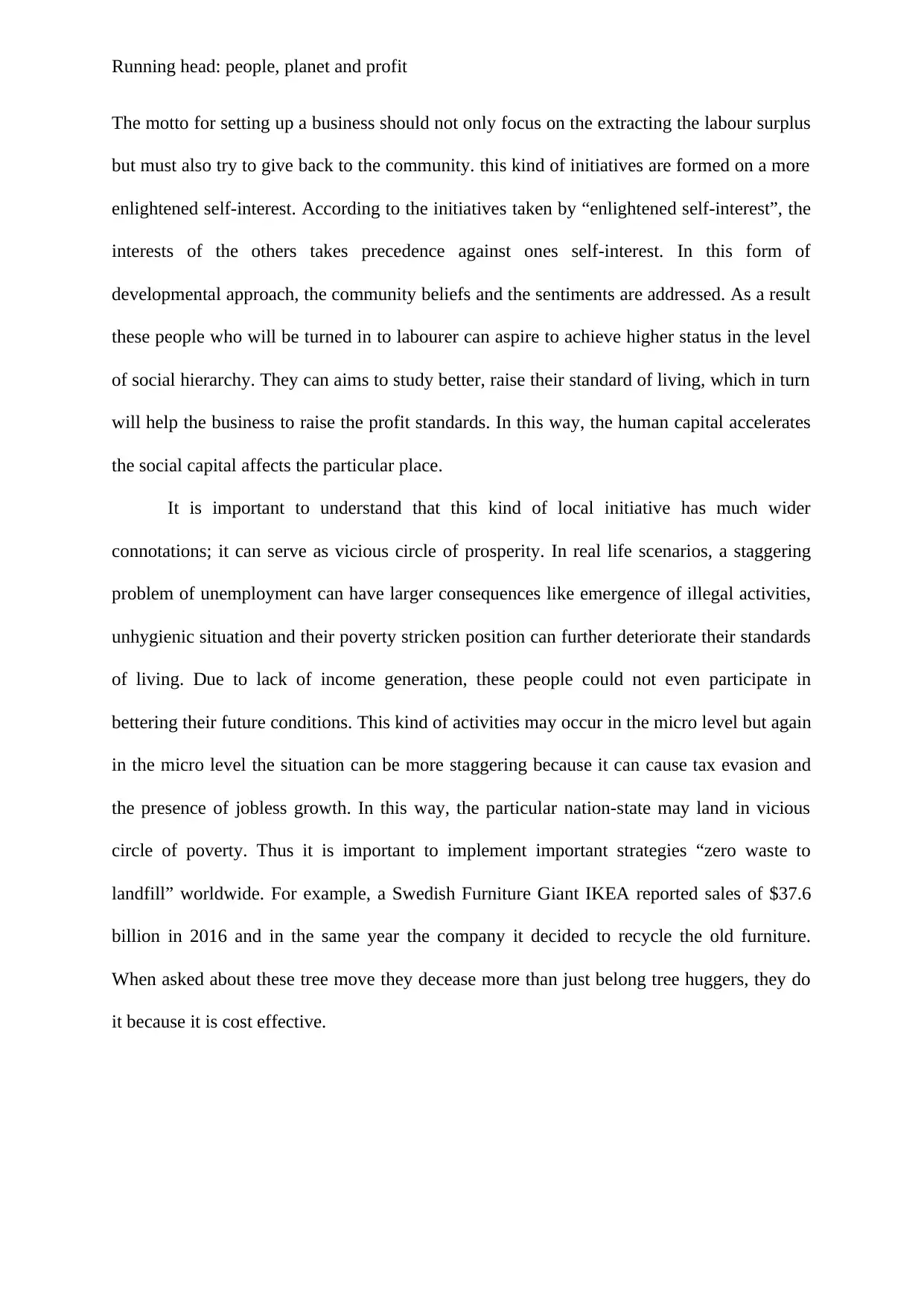
Running head: people, planet and profit
The motto for setting up a business should not only focus on the extracting the labour surplus
but must also try to give back to the community. this kind of initiatives are formed on a more
enlightened self-interest. According to the initiatives taken by “enlightened self-interest”, the
interests of the others takes precedence against ones self-interest. In this form of
developmental approach, the community beliefs and the sentiments are addressed. As a result
these people who will be turned in to labourer can aspire to achieve higher status in the level
of social hierarchy. They can aims to study better, raise their standard of living, which in turn
will help the business to raise the profit standards. In this way, the human capital accelerates
the social capital affects the particular place.
It is important to understand that this kind of local initiative has much wider
connotations; it can serve as vicious circle of prosperity. In real life scenarios, a staggering
problem of unemployment can have larger consequences like emergence of illegal activities,
unhygienic situation and their poverty stricken position can further deteriorate their standards
of living. Due to lack of income generation, these people could not even participate in
bettering their future conditions. This kind of activities may occur in the micro level but again
in the micro level the situation can be more staggering because it can cause tax evasion and
the presence of jobless growth. In this way, the particular nation-state may land in vicious
circle of poverty. Thus it is important to implement important strategies “zero waste to
landfill” worldwide. For example, a Swedish Furniture Giant IKEA reported sales of $37.6
billion in 2016 and in the same year the company it decided to recycle the old furniture.
When asked about these tree move they decease more than just belong tree huggers, they do
it because it is cost effective.
The motto for setting up a business should not only focus on the extracting the labour surplus
but must also try to give back to the community. this kind of initiatives are formed on a more
enlightened self-interest. According to the initiatives taken by “enlightened self-interest”, the
interests of the others takes precedence against ones self-interest. In this form of
developmental approach, the community beliefs and the sentiments are addressed. As a result
these people who will be turned in to labourer can aspire to achieve higher status in the level
of social hierarchy. They can aims to study better, raise their standard of living, which in turn
will help the business to raise the profit standards. In this way, the human capital accelerates
the social capital affects the particular place.
It is important to understand that this kind of local initiative has much wider
connotations; it can serve as vicious circle of prosperity. In real life scenarios, a staggering
problem of unemployment can have larger consequences like emergence of illegal activities,
unhygienic situation and their poverty stricken position can further deteriorate their standards
of living. Due to lack of income generation, these people could not even participate in
bettering their future conditions. This kind of activities may occur in the micro level but again
in the micro level the situation can be more staggering because it can cause tax evasion and
the presence of jobless growth. In this way, the particular nation-state may land in vicious
circle of poverty. Thus it is important to implement important strategies “zero waste to
landfill” worldwide. For example, a Swedish Furniture Giant IKEA reported sales of $37.6
billion in 2016 and in the same year the company it decided to recycle the old furniture.
When asked about these tree move they decease more than just belong tree huggers, they do
it because it is cost effective.
Paraphrase This Document
Need a fresh take? Get an instant paraphrase of this document with our AI Paraphraser
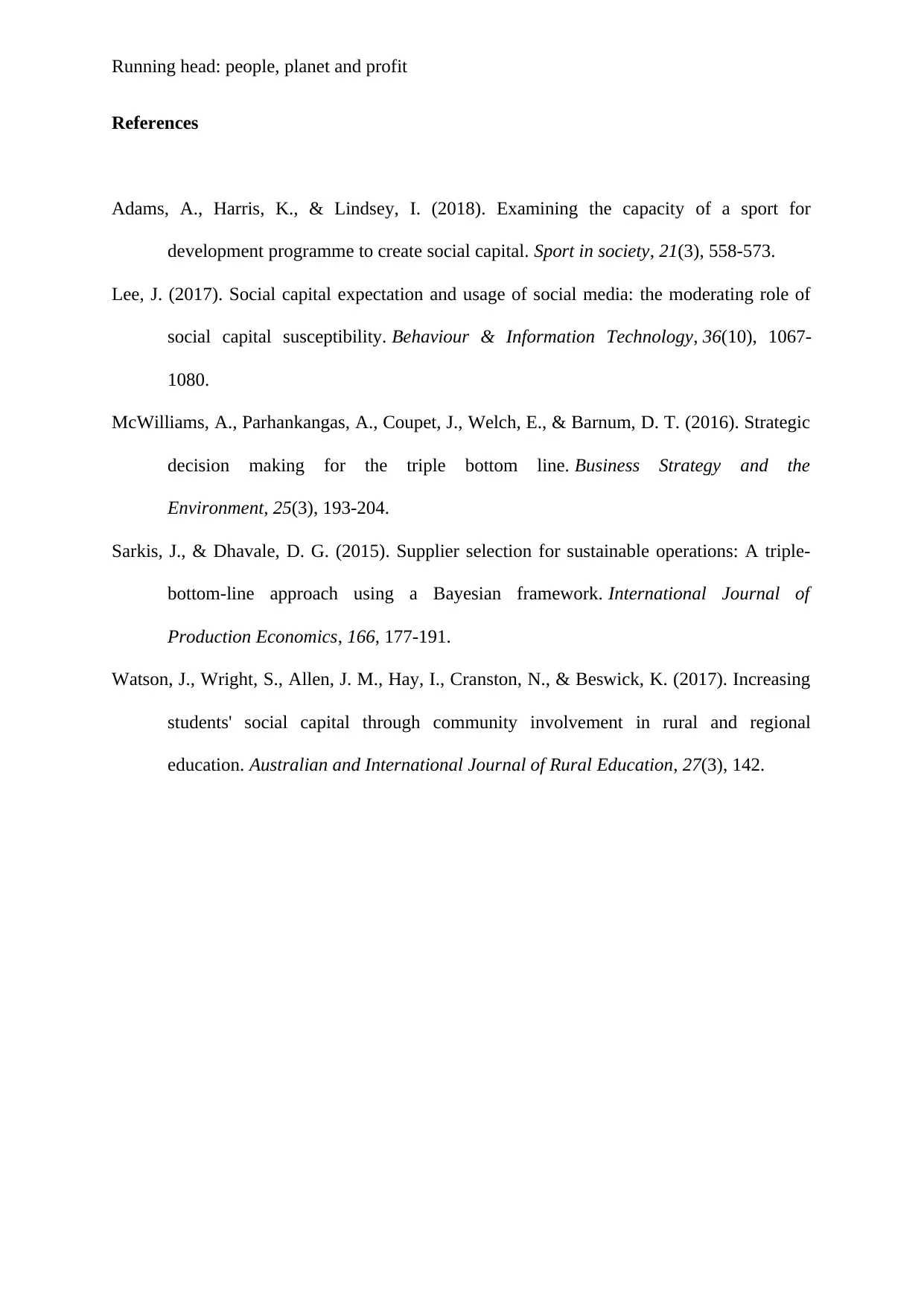
Running head: people, planet and profit
References
Adams, A., Harris, K., & Lindsey, I. (2018). Examining the capacity of a sport for
development programme to create social capital. Sport in society, 21(3), 558-573.
Lee, J. (2017). Social capital expectation and usage of social media: the moderating role of
social capital susceptibility. Behaviour & Information Technology, 36(10), 1067-
1080.
McWilliams, A., Parhankangas, A., Coupet, J., Welch, E., & Barnum, D. T. (2016). Strategic
decision making for the triple bottom line. Business Strategy and the
Environment, 25(3), 193-204.
Sarkis, J., & Dhavale, D. G. (2015). Supplier selection for sustainable operations: A triple-
bottom-line approach using a Bayesian framework. International Journal of
Production Economics, 166, 177-191.
Watson, J., Wright, S., Allen, J. M., Hay, I., Cranston, N., & Beswick, K. (2017). Increasing
students' social capital through community involvement in rural and regional
education. Australian and International Journal of Rural Education, 27(3), 142.
References
Adams, A., Harris, K., & Lindsey, I. (2018). Examining the capacity of a sport for
development programme to create social capital. Sport in society, 21(3), 558-573.
Lee, J. (2017). Social capital expectation and usage of social media: the moderating role of
social capital susceptibility. Behaviour & Information Technology, 36(10), 1067-
1080.
McWilliams, A., Parhankangas, A., Coupet, J., Welch, E., & Barnum, D. T. (2016). Strategic
decision making for the triple bottom line. Business Strategy and the
Environment, 25(3), 193-204.
Sarkis, J., & Dhavale, D. G. (2015). Supplier selection for sustainable operations: A triple-
bottom-line approach using a Bayesian framework. International Journal of
Production Economics, 166, 177-191.
Watson, J., Wright, S., Allen, J. M., Hay, I., Cranston, N., & Beswick, K. (2017). Increasing
students' social capital through community involvement in rural and regional
education. Australian and International Journal of Rural Education, 27(3), 142.
1 out of 5
Related Documents
Your All-in-One AI-Powered Toolkit for Academic Success.
+13062052269
info@desklib.com
Available 24*7 on WhatsApp / Email
![[object Object]](/_next/static/media/star-bottom.7253800d.svg)
Unlock your academic potential
Copyright © 2020–2026 A2Z Services. All Rights Reserved. Developed and managed by ZUCOL.



